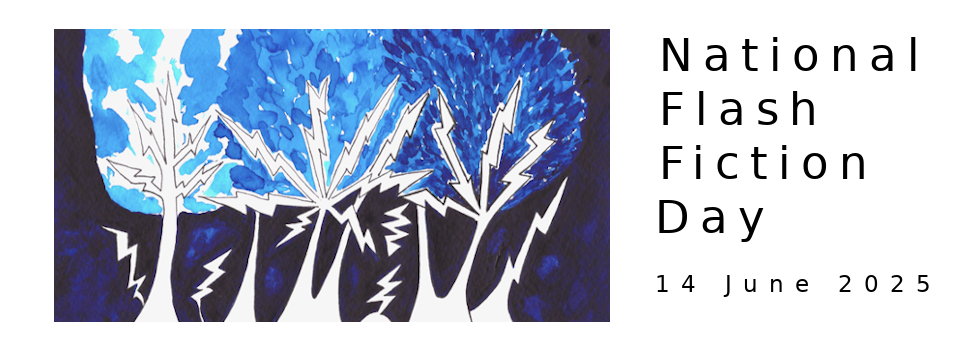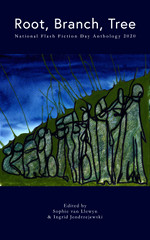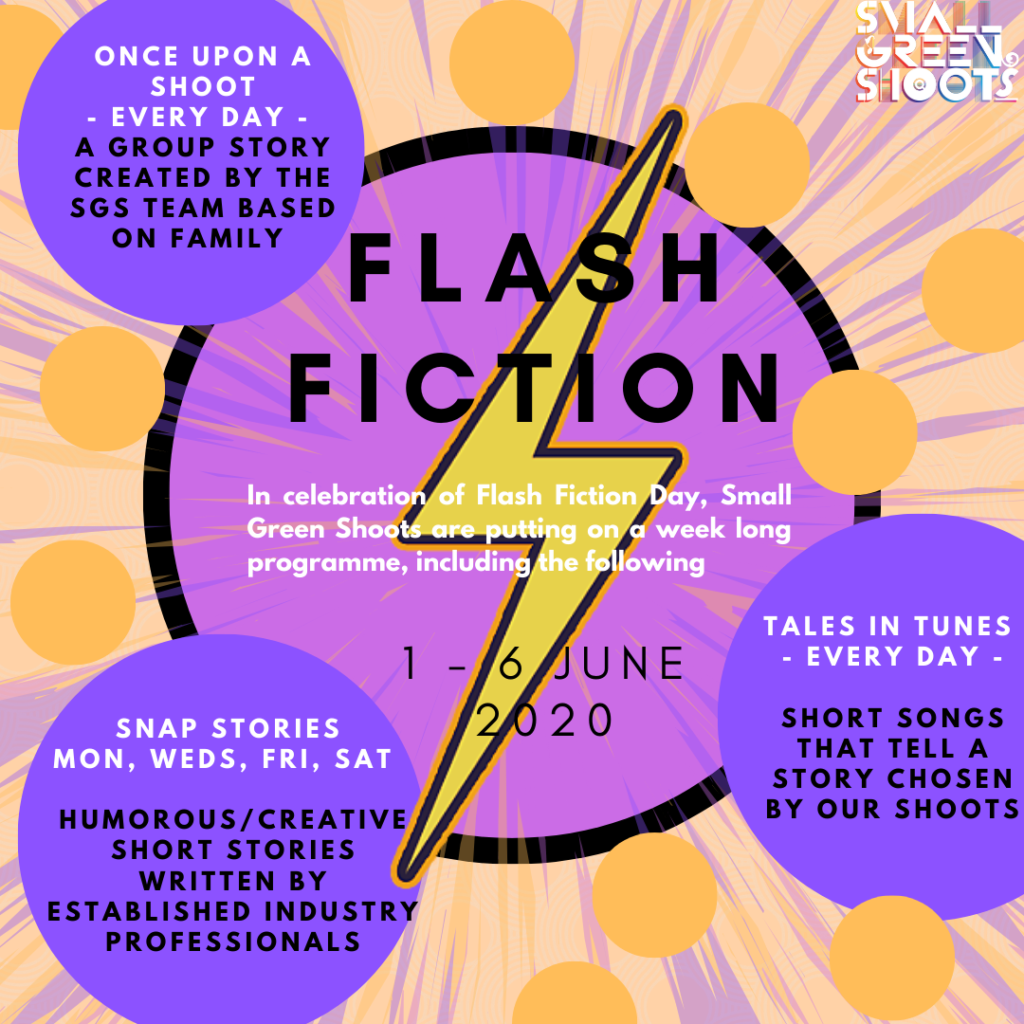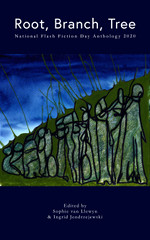We had to cancel our NFFD 2020 live event, so we've brought our celebration online. In our Flash Feast series, we've invited some flash superstars to share some videos and posts over the course of the day.
In our first Flash Feast, Michelle Elvy shares some thoughts about flash in an essay first appeared in SmokeLong Quarterly on 26 January 2017 as part of their Why Flash Fiction? series.
Four Vignettes on Flash Fiction
by Michelle Elvy
- Prélude
When I was a kid, I studied classical piano. I played the requisite Bach and Beethoven, Chopin and Brahms, sure. But my favourite works, hands down, were Sergei Rachmaninoff’s Russian Easter (Suite No.1 for Two Pianos, op.5 mov.4) and Claude Debussy’s La fille aux cheveux de lin (The girl with the flaxen hair, also known as Prélude No 8). I played Russian Easter with my two-piano partner; the relentless ringing of those bells rumbled my soul. The composer said he had written the suite to paint a picture – and I believed it. At around three minutes, it was demanding and challenging. It required control and focused energy. It told a story in a short interval with a bang – that piece, more than any other we played, was the very embodiment of intensity and precision.
But if I loved the technical challenges of Rachmaninoff, my favorite piano piece to play, when I was sixteen, was Debussy’s No 8 in his Book of Préludes. I could bang out more outwardly impressive works, sure, and even longer ones. But I was in love with that piece because of the apparent simplicity hiding a rich well of emotional content. I loved the colours, the harmonies. I loved all 39 measures, all 2 ½ minutes. I loved it for its brevity, and for its emotional impact. I loved that, precisely because of the quiet nature of the piece, every single note mattered. I loved it for its deceptively complex expansiveness, for the challenge of the phrasings, for the rolled chords. I loved it for the hushed legato, the subtle phrasing. I loved it for the quiet echoes that remained after I’d reached the last note. Playing Debussy’s Prelude No 8 was my first introduction to something so short and so powerful and so beautiful.
- Birds
In a recent discussion about prose poetry, New Zealand poet Michael Harlow wrote about the idea of story and language:
Inherent in all poems (there may be some exceptions) is some ‘story’ or fragment of a story wanting to be told or beginning to be told. It is in the nature of language that one word is always in search of another word, and then another.
I like this idea of words chasing each other, or perhaps singing to each other. Flash fiction can be as wee as two birds on a fence – but they can’t just be sitting there; they have to be shifting, or chatting, maybe even singing. Singing may be too much – trending toward the expected thing birds would do. But they must be doing something. That’s what makes it a story. Two birds in collusion, or in conflict, or in love – something about their relationship is central to them sitting there on the wire. The birds/ words seeking the relationship: that’s what makes the story.
Someone asked me recently how ‘What we ate’ is a story. I think the answer lies in the idea that the words must be seen in relation to each other, as Harlow suggests. We like to trim away adjectives and adverbs in flash fiction – but this story is going too far! It’s all nouns! Look:
Honey
Honey, fish and toheroas
Honey, fish and toheroas, plus eels
Honey, fish, and toheroas, plus eels, and also ducks
Honey, fish, and toheroas, plus eels, and also ducks, and pheasants and hares
Honey, fish, and toheroas, plus eels, and also ducks, and pheasants and hares, and godwits
Honey, fish, and toheroas, plus eels, and also ducks, and pheasants and hares, and godwits and snipe
Honey, fish, and toheroas, plus eels, and also ducks, and pheasants and hares, and godwits and snipe, plus kumara, spuds, corn and watermelon from Spirits Bay
And yet, there’s an implied relationship to the nouns – a before, and before, and before. Or an after, and after, and after. Either way: the words are chasing each other. There’s a momentum in their arrangement on the page. The language is what matters here. Content matters (though content in this case is limited by a historical document – this is found material), but content can only be achieved via language. It’s a bit of a leap to find the story in lines that are essentially lists of nouns. But if you look, I think it’s there, possibly in the implications of the words ‘and’ and ‘plus’. To me, flash is about play, about breaking down expectations. Look again: maybe you’ll see that’s not merely an arrangement of nouns. Something happens. Something changes over time. And it happens in a particular place, too. Whether it’s a good story or not – well, that’s not for me to decide.
But there they are, those words, chasing each other line after line, like a family of birds.
- Beast
I don’t count words when I wrote flash fiction. Not anymore. I write and the story takes shape. I know the feel of a 250-word story versus a 1000-word story versus a micro. I know if it’s going to sprawl into something more; some things you can’t say in 1000 words. With flash, I count at the end, yes – to see where I’ve arrived. Then I step back and see if the word count matches the feel of it. And the feel determines what kind of story it is – not the word count. That’s why I balk at the six-word story, never mind Hemingway’s mythically proportioned napkin. The six-word story is, for me, too brief. There can be expert six words. But they are rare, and they seldom reach the brush stroke beauty or the emotional mystery of the simple haiku. An awful lot of six-word stories result in summary (the tiny memoir is a classic) or declaration (see me or don’t: I matter) or the overly clever (giveaway: wedding dress, worn and fucked). Those are pithy and maybe even fun, but they don’t breathe much life. How can there be life if there’s no pulse, no movement? Life happens beyond gimmick. And so does a really good story. The pulse is what matters. The essence, the pull, the rhythm and music. Not strict word count. Sure, we impose word counts in journals we edit: 1000 here, 500 there, 250 there. But that’s merely a framework, something that helps tame the wild beast. The key is to let the beast roar, somehow, no matter which format the story takes. I like that in a 250-word story, or even a smaller micro, the beast growls below the surface. In the 500-word story, he may actually say something, and tangle with more than a couple other characters. In the 1000-word story, he may experience a full evolution of some kind. No matter the word count, it’s the deep reverberating hum of the beast’s heart that matters most. The scratching beneath the surface, the inevitable howl.
- Tell tales
Depart. Sail across an ocean. Arrive in port. Life has happened while you’ve been disconnected. But life is here, in this space, in your boat. Thirty days at sea: a blip or an eternity. Time and space collapse. Ocean swells lift you and drop you and lift you again. You think you stop time but no: time is relentless, neverending. Current flows. Wind comes and goes and comes again. Sometimes screaming, sometimes sighing. Your jib frays in light wind. You look up and see the tell tales have gone. When did they go? It doesn’t matter. Life is still happening, and you’re sailing on, tell tales or not.
 Michelle Elvy teaches online at 52|250 A Year of Writing, edits at Flash Frontier: An Adventure in Short Fiction and Best Small Fictions and chairs National Flash Fiction Day NZ. Recent anthology work includes Bonsai: Best small stories from Aotearoa New Zealand (Canterbury University Press 2018) and Ko Aotearoa Tātou | We Are New Zealand (Otago University Press 2020). She has guest edited and judged competitions for SmokeLong Quarterly, Flash 500, Reflex Fiction, Bath Flash Fiction Award and the Whangarei Poetry Walk, among others. Her book, the everrumble (Ad Hoc Fiction, 2019), launched at the 2019 UK Flash Fiction Festival. Michelle lives in Dunedin, NZ. michelleelvy.com
Michelle Elvy teaches online at 52|250 A Year of Writing, edits at Flash Frontier: An Adventure in Short Fiction and Best Small Fictions and chairs National Flash Fiction Day NZ. Recent anthology work includes Bonsai: Best small stories from Aotearoa New Zealand (Canterbury University Press 2018) and Ko Aotearoa Tātou | We Are New Zealand (Otago University Press 2020). She has guest edited and judged competitions for SmokeLong Quarterly, Flash 500, Reflex Fiction, Bath Flash Fiction Award and the Whangarei Poetry Walk, among others. Her book, the everrumble (Ad Hoc Fiction, 2019), launched at the 2019 UK Flash Fiction Festival. Michelle lives in Dunedin, NZ. michelleelvy.com






 Join us from 7 – 10 pm BST for the virtual launch of the 2020 NFFD Anthology, Root, Branch, Tree.
Join us from 7 – 10 pm BST for the virtual launch of the 2020 NFFD Anthology, Root, Branch, Tree.
 Jonathan Cardew is a contributing editor for Best Microfiction and blog editor/ workshop leader for Bending Genres. His flash fiction appears or is forthcoming in SmokeLong Quarterly, wigleaf, Passages North, Atticus Review, Craft Literary, Superstition Review, and others. Originally from the UK, he lives in Milwaukee, Wisconsin.
Jonathan Cardew is a contributing editor for Best Microfiction and blog editor/ workshop leader for Bending Genres. His flash fiction appears or is forthcoming in SmokeLong Quarterly, wigleaf, Passages North, Atticus Review, Craft Literary, Superstition Review, and others. Originally from the UK, he lives in Milwaukee, Wisconsin. Michelle Elvy teaches online at
Michelle Elvy teaches online at  We're gearing up for our virtual launch of the 2020 NFFD Anthology tomorrow, but in the meantime, here's a sneak peak at the beautiful cover featuring art by our artist-in-residence, Jeanette Sheppard.
We're gearing up for our virtual launch of the 2020 NFFD Anthology tomorrow, but in the meantime, here's a sneak peak at the beautiful cover featuring art by our artist-in-residence, Jeanette Sheppard.